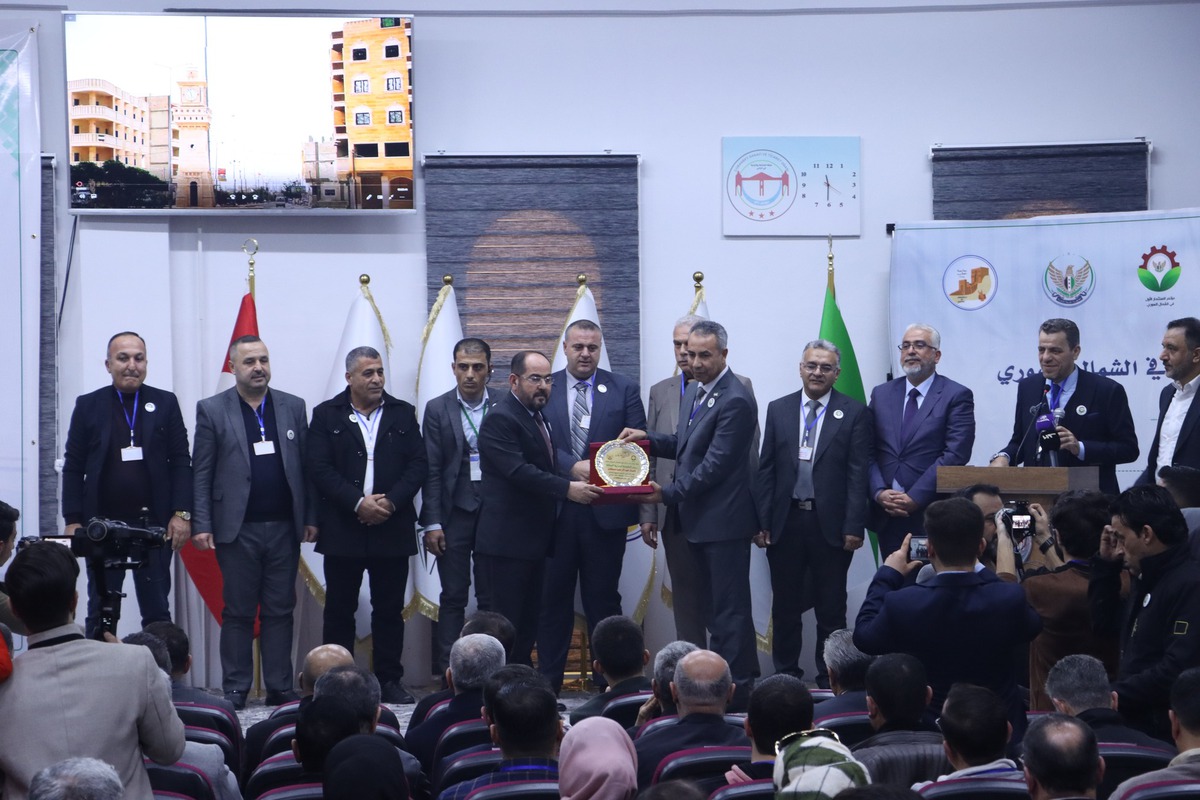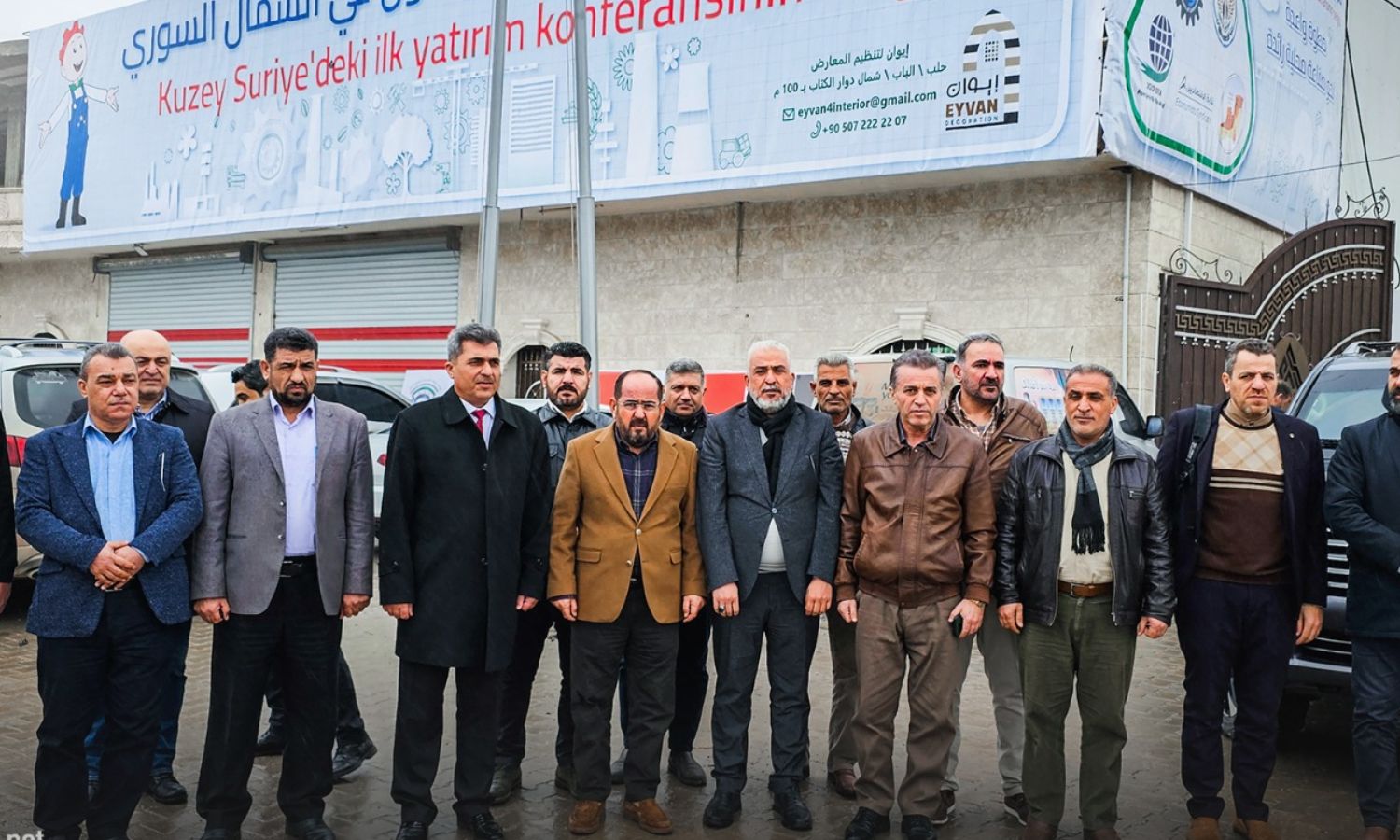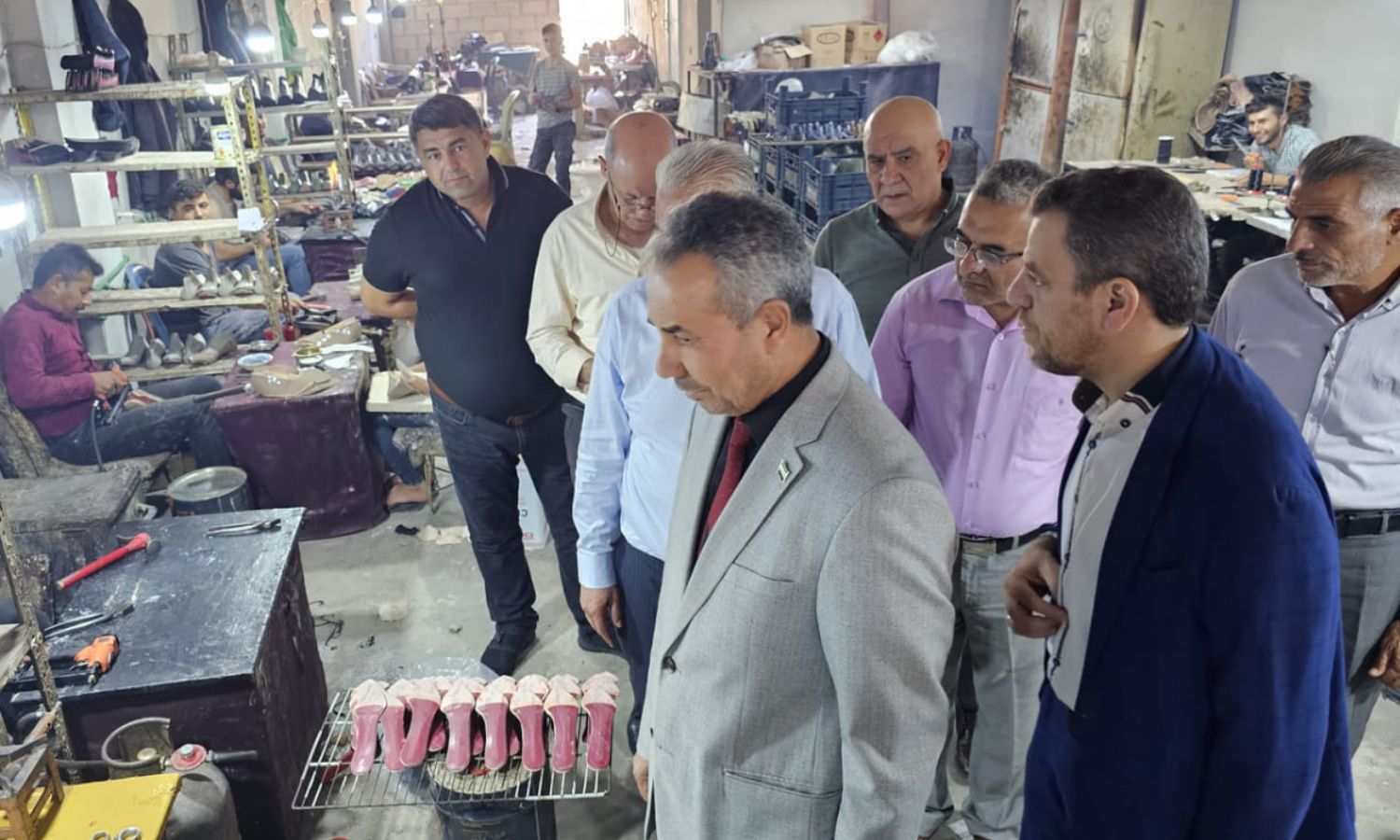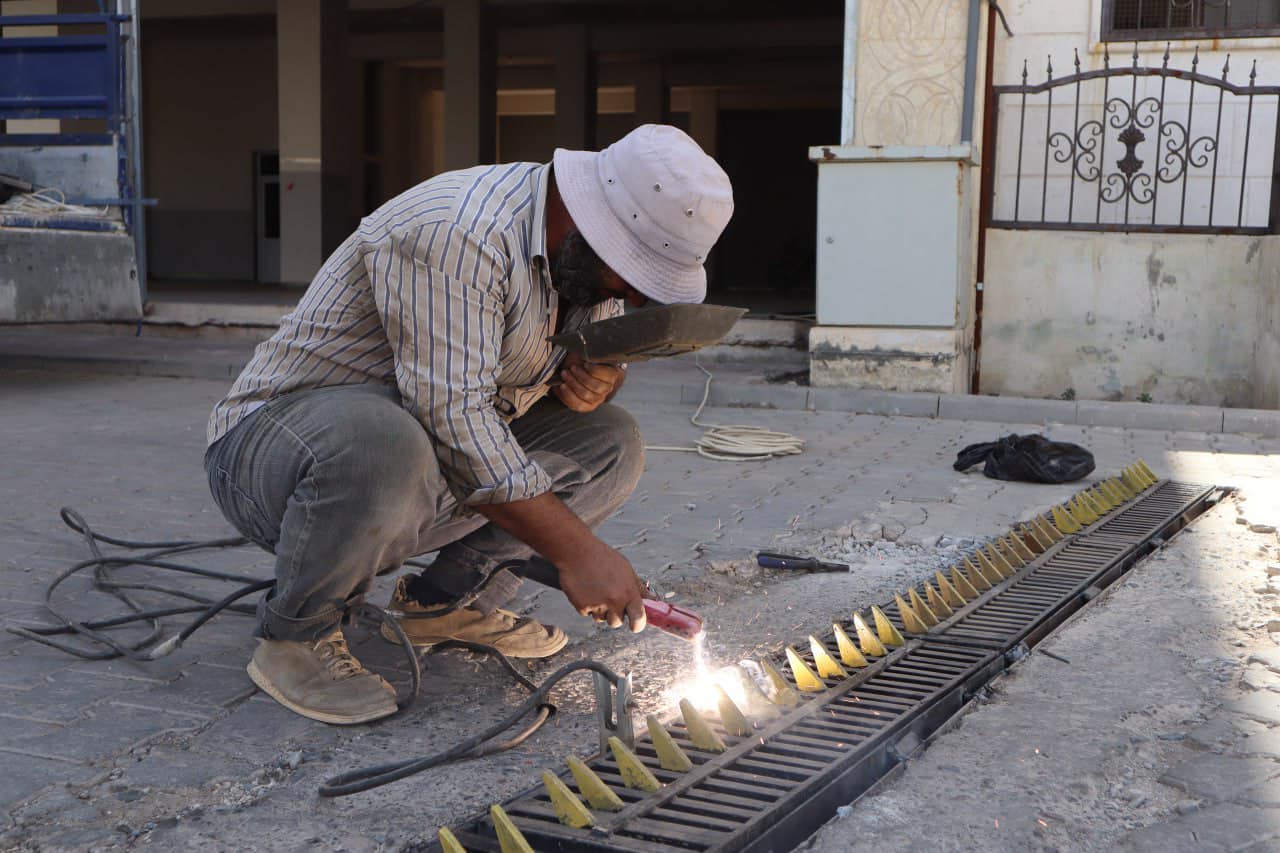



Hassan Ibrahim | Jana al-Issa | Reham al-Sawadi
Periodically, attempts to revive the economy and create an investment-friendly environment in rural northern and eastern Aleppo emerge, where the Syrian Interim Government (SIG) holds sway amid efforts by the latter to attract investors and draw attention to the available potentials, setting the map for investment.
Efforts, potentials, and money resulted in six industrial cities and commercial and investment projects amid a deteriorating economic and living situation for residents, within an environment experiencing chaotic security from shelling and skirmishes, factions multiplicity, extortion demands, and a lack of accountability in thorny issues, amidst financial obstacles from the absence of banks and the depreciation of the Turkish lira (the circulated currency), and legal hurdles in protecting investors’ money and projects.
The latest of these attempts was the first investment project in the town of al-Rai in rural Aleppo, supported and supervised by the Syrian Interim Government, following statements by the opposition Syrian National Coalition about turning inwards to develop the economy, and a year and a half after the Turkish government, which has significant influence in the region, pledged to create a “safe zone” and repatriate one million Syrian refugees in a “dignified voluntary return” to their country.
Enab Baladi sheds light in this file on the investment reality in the region, discussing with researchers, specialists, and experts the potentials for it, the nature of possible projects, and the region’s needs to establish an investment-friendly environment, and the extent to which this is related to the “voluntary return” project, and the responsibility to protect investors’ funds and ensure their rights.
After preparations lasting over two months, media promotion, sessions, and meetings, the Interim Government opened the first investment conference on January 17, at the industrial city site in al-Rai, organized by the Ministry of Finance and Economy in the Interim Government, Free Aleppo University, the Economists Syndicate, and the “2020 IDEA” Foundation, to last for two days but it continued for four days.
The conference carried the slogan “Investment… Stability, Development, and Prosperity,” and it was opened by the head of the Interim Government, Abdul Rahman Mustafa, who considered the conference a positive indicator of the efforts seeking to improve the economic reality in the region; on the sidelines of the conference, an exhibition of local products was organized, with scientific research presented discussing the investment reality and experiences of projects in the region, how they started, and where they reached?
Head of the conference organizing committee, Ali Halaq, told Enab Baladi, that the conference witnessed the attendance of 45,000 visitors and had 53 sections (stands), of which 47 are Syrian, and six are Turkish, and contributed to securing 1,500 temporary job opportunities for accomplishing decorations, carpentry, printing, and more.
According to Halaq, investors from the United States, the European Union, Qatar, and Turkey participated in the conference, as well as investors from opposition-controlled areas, and the conference presented the strengths that the northern region possesses, from industrial cities and chambers of commerce and industry to infrastructure.
The Minister of Economy in the Interim Government, Abdul Hakim al-Masri, told Enab Baladi, that the exhibition witnessed participation from 60 to 70 investors and researchers from outside opposition-controlled areas, noting that the turnout “exceeded expectations.”
Al-Masri added that the exhibition held during the conference gave a “positive” image of local products and investment in the region, to be a motivator to support investment in the northern region and the small projects that secure job opportunities.
The conference aims, according to al-Masri, to develop the northern region economically and contribute to improving the standard of living and increasing job opportunities, through five determinants: creating an attractive investment environment, evaluating the investment reality in northern Syria and identifying its requirements, establishing business incubators to develop small projects, stimulating young energies to take initiative in entrepreneurial leadership, and reaching strategic partnerships at both the internal and external levels in the investment sector, and setting a map of investment from a sustainable development perspective.

The Syrian Interim Government inaugurates the first Investment Conference in rural Aleppo – January 17, 2024 (The Syrian Interim Government)
The Interim Government offers facilities for investors, including reducing all fees for import and export goods produced within the industrial cities, and grants each investor within the city a free transit permit to Turkey throughout his investment period for the facility, and considers the city’s land as private property, granting the buyer a title deed from the real estate registry, but that does not prevent concerns about investing in the area.
There are six industrial cities in the northern and eastern rural Aleppo, one in the city of Jarablus, extending over an area of 20,000 square meters, with work starting on it in June 2021, and it includes 200 factories.
The second is located south of the city of Souran, covering an area of 50,000 square meters and has 200 operational factories and 1,500 workers. The price per square meter within the city ranges between 30 and 40 US dollars.
In Azaz, there is an industrial city still being prepared, with an area of 85,000 square meters, with 41 plots sold in it, and the first factory opened in the region in May 2023.
The al-Bab industrial city is the first of its kind in opposition-controlled areas, founded in 2018, and is privately owned by businessman Omar Waki, who obtained a license to organize it as an industrial city.
The industrial city area in al-Bab is 564,900 square meters, containing 60 factories manufacturing tanks, well-drilling rigs, gas stoves, and others, with 1,500 workers.
The industrial area in Marea extends over an area of 130,000 square meters, with work starting in 2018, and it contains 320 factories and 320 workers.
Sixth, is the industrial city in al-Rai, which is the largest in the region with an area of one million square meters, containing 1,384 factories, and 7,600 workers. The city of al-Rai is known for its shoe manufacturing and exports abroad through Turkey.
The vice-president of the Syrian National Coalition, Abdul Majid Barakat, stated during the conference that it is essential to transition from waiting for humanitarian aid to a phase of production and self-reliance. He pointed out that work cannot be postponed until a 100% suitable environment is achieved in any region of Syria.
Barakat added that there are obstacles regarding the export of products and the import of raw materials, emphasizing the necessity of facilitating the movement of Syrians and foreign investors across borders, as well as banking services. He clarified that these obstacles have been identified in order to work on finding solutions for them, in cooperation with Turkey.
Kamal Qasim, a Syrian residing in Turkey, was among the attendees at the investment conference. He told Enab Baladi that he is interested in investing in the northern region but has concerns about a “weak” security situation and infrastructure challenges such as poor roads and transportation, and difficulty entering and exiting Turkey. He added that the parties managing investments are “undefined and lack authority.”
Omar Malla Hamid, who owns a factory for manufacturing gas stove heads in the city of al-Bab in eastern Aleppo countryside, told Enab Baladi that his incentive to invest in the area was a desire to increase income and his ability to compete with imported products in terms of quality and appropriate pricing.
He also mentioned that the region could yield profits for investors in industrial, real estate, or commercial sectors due to the lack of restrictions that hinder investments and the local industry, such as taxes and factory licensing. However, he considered that the greatest difficulty lies in the instability in the area.
Abdul Rahman Afoura, the owner of al-Salam for Metal Melting factory, started his work in the industrial zone of al-Bab in November 2022, to economically revive the area, in addition to the low taxes and labor costs.
Afoura mentioned to Enab Baladi that there is no protection for the product in terms of import and export since metal melting relies on purchasing scrap iron and remelting it. The issue arises from selling the scrap to neighboring countries, which has led to its scarcity in the region and thus an increase in its price.
In the same context, Musab Omar al-Tayeb, the director of the Omar al-Tayeb Group for Industry and Commerce, which his father founded in 1989 and has a branch in the industrial city of al-Bab, said that factories face difficulties in exporting.
Al-Tayeb mentioned that the Omar al-Tayeb Group used to export its products to nearly 25 Arab and foreign countries. However, the increased cost of exporting, which once reached 5000 US dollars, prevents him from exporting outside Syria at present.
The “voluntary return” project for Syrian refugees, which Turkey has been seeking since May 2022, comes to the fore with any talk about establishing an investment environment in northern Syria. The Turkish President, Recep Tayyip Erdogan, at the time made statements that included talks about building homes and securing shelter and livelihoods in the areas where refugees return to northwest Syria.
In December 2023, the Turkish Interior Minister, Suleyman Soylu, announced the “voluntary” return of 604,277 Syrians during the first 11 months of the year to their country, without specifying the legal status of the returnees.
Despite documentation by human rights and humanitarian organizations, border crossings, and media of deportation operations of Syrians and their signing of “voluntary return” papers, the minister mentioned that the Turkish state works to ensure the return of Syrians in a “voluntary, safe, and dignified” manner, of their own free will on a rational and human rights-oriented basis by taking into account every aspect of life.
The number of Syrian refugees in Turkey under the “temporary protection” system is 3,194,185 refugees, according to the latest statistics issued by the Turkish Presidency of Migration Management on January 18.
Northwest Syria is home to 4.5 million people, 4.1 million of whom need assistance, 3.3 million suffer food insecurity, 2.9 million are internally displaced, with two million living in camps, according to the United Nations, while local statistics speak of 5.5 to 6 million persons.
After taking over the presidency of the opposition’s Syrian National Coalition in September 2023, Hadi al-Bahra launched a plan to uplift northern Syria economically. He told Enab Baladi that the economic and service advancement is a “general trend for the Coalition,” expressing his support for the concept of “voluntary and dignified return” of Syrian refugees in all countries of asylum.
Al-Bahra considered that the Coalition’s and the Interim Government’s (the Coalition’s executive arm) current approach is to bring more Syrian businessmen and investors into Syria to broaden this type of economic activity and to direct international relief programs to enhance productive capacities and to secure grants and small loans for areas in northwest Syria instead of relying on relief aid.
He noted that the Coalition supports the refugee’s right to asylum, their right to seek protection, and to be treated with dignity and humanity according to international law, in addition to rejecting the “forced return” of any Syrian refugee, as their return should be based on a decision they have made themselves based on the conditions available in Syria.
Al-Bahra considered that the economic plan in northern Syria is a “trend” for the Coalition, and not a project coinciding with Turkey’s project of “voluntary return” for Syrian refugees. He added that the Coalition aspires for Syrian businessmen and the Syrian expertise to start thinking about returning to Syria and participating in the “uplifting of northern Syria” project.
In December 2023, a fifth preparatory workshop for the conference was held via the Zoom application, participated in by businessmen and academics residing in different countries, such as the United States, France, the Netherlands, and Turkey. They agreed on the importance of the conference, especially in the current phase oriented towards “voluntary return,” while Abdul Hakim al-Masri, the SIG’s Minister of Economy, considered that there is no return without job opportunities.

Abdul Hakim al-Masri, Minister of Economy in the Syrian Interim Government, during a visit to the industrial city in al-Rai – October 11, 2023 (Chamber of Industry and Commerce in al-Rai/Facebook)
Holding the conference and the accompanying media push opened the door to questions about the readiness of northern Syria in general and the Aleppo countryside in particular to be a safe area for investment.
Foreign investors must study and determine the risk of the “investment climate” in a country before making their investment decision, according to a report published on Investopedia, specialized in finance and investment.
The “investment climate” refers to the economic, financial, social, and political conditions in a country, which affect the willingness of individuals, banks, and institutions to lend to the country’s working private companies.
The investment climate is indirectly affected by several factors, including levels of poverty, crime rates, infrastructure, workforce participation, national security considerations, political stability, taxes, liquidity, financial market stability, rule of law, property rights, the regulatory environment, government transparency, and government accountability.
The Interim Government, the political umbrella of the Syrian National Army (SNA), controls the northern and eastern countryside of Aleppo, including the cities of Tel Abyad and Ras al-Ain. Its services are active, and it supervises these rural areas. However, it faces criticism for neglecting Tel Abyad and Ras al-Ain, abandoning strategic crops, and failing to provide the necessary support to create a better service-oriented, economic, and living environment.
In June 2020, the Interim Government and even the Salvation Government in Idlib adopted the Turkish lira as a currency, due to its stability compared to the Syrian pound, along with the US dollar in external trade transactions.
This switch to the Turkish currency in northern Syria came after the exchange rate reached around 3,500 Syrian pounds for one dollar in June 2020. Amid calls from Syrians, the switch was seen as a temporary solution until a political resolution could be achieved, and currently 30 Turkish liras equals one US dollar.
The lowest wage for public sector employees in the northern and eastern countryside of Aleppo is 1,140 Turkish liras, given to single muezzins and single sanitation workers, while the married ones receive a salary of 1,235 Turkish liras. The salary for teachers reached 1,750 Turkish liras for singles and 1,925 liras for those married.
The recognized poverty line in northern Syria is at 9,314 Turkish liras, and the extreme poverty line is at 6,981 Turkish liras. The unemployment rate averages 88.74% (considering day labor within the mentioned categories), according to the Syrian Response Coordination Group (SRCG) working in the region.
Daily wages in the rural areas of Aleppo range between 60 and 100 Turkish liras (approximately three US dollars), varying based on the number of working hours and the nature of the occupation, such as agriculture, manual labor, or construction.
Investment is one of the most important economic indicators and is the only economic factor capable of improving the economic and social indicators in northern Syria, according to Yahya al-Sayed Omar, a researcher in political economy.
Omar told Enab Baladi that investment cannot take place without several pillars, including economic, political, and security stability, as well as legislative requirements, infrastructure, energy carriers, disposal markets, and an advanced financial environment. Many of these requirements are currently unavailable or are at minimal levels.
The researcher considered the Investment Conference in northern Syria an important step in developing and encouraging investment in the area, but it is not sufficient and must be accompanied by other executive steps.
On his part, Manaf Quman, an economic researcher at the Omran Center for Strategic Studies, clarified that there are three determinants of investment in any region in the world. These include a secure environment, good governance, and extensive access, meaning reach to regional and international markets, as well as financial tools for obtaining loans, funds, transfers, and the like.
Quman, in conversation with Enab Baladi, believes that these three determinants are not present in the rural Aleppo area or the northwest regions of Syria in general and do not comply with international investment standards or compete in the global markets. The region still suffers from security disturbances from time to time, in addition to the lack of safety in political, economic, and social aspects.
For example, the lack of safety means that investors cannot register their trademarks, or in the event of a commercial dispute between two institutions or entities, it cannot be resolved. Quman pointed out that addressing these issues is the main goal of the investment conference, which aims to create a safer environment for investment and to establish wise governance that ultimately aims to create investments.
The researcher believes it is impossible to compare investment standards in Dubai, Doha, or the Turkish city of Gaziantep with those in rural Aleppo because the environments are different. Those cities have safer and stabler environments with significant investments and advanced governance compared to the very nascent environment in rural Aleppo, where local councils, chambers of industry and commerce, and factories are all recently established.
According to these data, Quman considers northern Syria to be a relatively safe area for investment, considering the definition of relative safety within the context and situation in Syria, and compared to the conditions prevalent years ago, where an environment has recently been activated allowing the operation of factories and facilities of any kind.
The projects that may succeed and help the region recover are factories, workshops, and sites in all productive sectors, relying primarily on two main suppliers in the area – one natural and the other human – as seen by the researcher Manaf Quman.
The human resource in the area stands out due to high and diverse competencies enforced by the reality of displacement, as well as lower labor costs which offer competitive opportunity and reduce production costs. Meanwhile, natural resources are mostly varied agricultural products, in addition to some metal industries particularly prominent in the city of al-Bab.
The political economy researcher Yahya al-Sayed Omar considered that investing in northern Syria has several advantages and incentives, such as the availability of manpower, proximity to energy sources, proximity to targeted export markets, and the absence of investments in the area. However, it is not considered an attractive investment area under the current unstable conditions, including the fragility of political and security stability, and the general economic environment is unstable as there are no economic institutions managing financial and monetary indicators.

Installation of spike strips on the main streets of the industrial area in the city of al-Rai – September 20, 2023 (Al-Rai Chamber of Industry and Commerce/Facebook)
One of the most prominent obstacles to investment in the region is the challenges themselves, represented by a safe environment, good governance, and access to markets, according to researcher Manaf Quman, who points out that every tangible development in the security of the region on the one hand, in its governance, and in the access of its product to international and regional markets, and access to available financial tools, would contribute to developing the investment environment.
Additionally, there are other obstacles linked to the political ambiguity of the region, recurring bombings, and internal conflicts, as well as the lack of international funding alongside reliance on a food basket without self-reliance, Quman says.
Researcher Yahya al-Sayed Omar agrees with Quman’s viewpoint that in the absence of stability, it is impossible to talk about encouraging investment, considering that the region, despite relative stability, is poised at any moment for a security escalation. Moreover, there are additional hurdles, most notably the absence of a stable economic policy and difficulties in exporting production without origin certificates.
Al-Sayed Omar believes that all the aforementioned obstacles can be overcome, but it requires regional and international support from Turkey and major countries and international institutions, as well as the presence of a general roadmap to resolve the Syrian issue since the current political and military situation does not support investment, as the region could at any moment be a candidate for military escalation.
The director of the Syrian program at the Observatory of Political and Economic Networks, Karam Shaar, told Enab Baladi that the most significant security challenges that might face investors in the region are largely related to the National Army controlling the area without being able to regulate some of its elements accused of corruption and various violations.
The state of insecurity with frequent violations and internal conflict is apparent in northwest Syria, with clashes near various front lines, and the rural areas of Aleppo, Ras al-Ain, and Tel Abyad being subjected to bombardment from regime-controlled areas and Syrian Democratic Forces (SDF), as well as mutual infiltration operations. Meanwhile, Idlib and its rural areas witness almost daily bombing from the regime and intermittent Russian air raids.
There is competition between the factions of the National Army resulting in frequent internal conflicts, with its members totaling 80,000 fighters, according to the Syrian National Coalition in 2019, while a report by the Middle East Institute mentioned that the formation includes 50,000 to 70,000 fighters.
Some factions are accused of committing violations without accountability, such as the case of the assassination of a media activist in the city of al-Bab in Aleppo’s countryside, and the trial of the commander “Abu Amsha” which has not been implemented. In addition, some leaders have faced US sanctions for their involvement in human rights violations, imposing levies, and their responsibility for kidnapping and killing operations.
Other obstacles are linked to the lack of a clear regulatory framework for investment, as numerous promises have been made through this conference without clear legal means in this context, according to Shaar, who also notes that the lack of women’s participation in the conference is a major issue.
For his part, the Minister of Economy in the Interim Government, Abdul Hakim al-Masri, explained to Enab Baladi that investing in the region is not easy, and there are significant challenges, including the security situation. He noted that the industrial cities have not witnessed any incident of aggression against investors’ property, calling the industrial cities “protected.”
The minister added that if investments are activated, insurance companies could open, protecting investors’ properties, without neglecting the presence of systems, judiciary, and executive power in the region, in case of any issues, pointing out that the Interim Government has taken security measures and tightened procedures to prevent any infringements.
Al-Masri also pointed to cases beyond control, such as bombardment by regime forces or the SDF in the region.
Abdul Azim al-Mugharbel, an assistant researcher at the Jusoor for Studies Center, told Enab Baladi that the environment and infrastructure as well as the security reality have been obstacles to investment in the region for years. However, if the Ministry of Defense related to the Interim Government fulfills its commitments to securing stability, and the Ministry of Finance and Economy offers facilitations such as activating insurance companies, facilitating export, securing raw materials and necessary infrastructure, and securing certificates of origin, and coordinating with the Turkish side, a significant part of the obstacles can be avoided. This approach could attract investment to the region and help accelerate economic activity and improve the reality of areas under opposition control.
if you think the article contain wrong information or you have additional details Send Correction